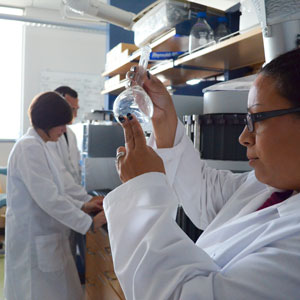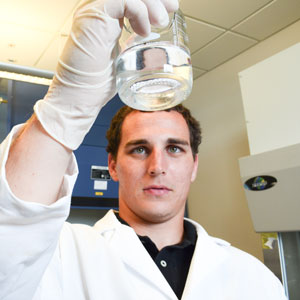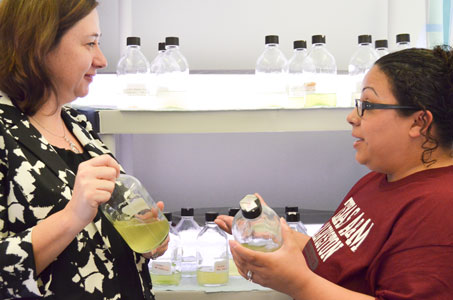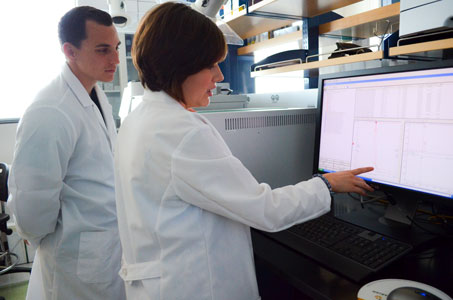Educating the next generation of highly talented scientific leaders
TweetWithout them, the United States would not have won WWII, explored space or become a world leader. Those who led the nation in such endeavors are scientists, technologists, engineers and mathematicians. But, since the 1970s, their numbers have been diminishing – threatening the long-term prosperity of the nation.
At Texas A&M University at Galveston, the best and brightest students who show promise in Science, Technology, Engineering and Math (STEM) are offered a chance to develop their potential, advance STEM understanding and become the next generation of diverse leaders of the 21st Century.
Patrick Louchouarn, vice president for academic affairs and chief academic officer at Texas A&M Galveston, says STEM students and faculty are working towards international breakthroughs in marine science.
“Many of our scholars and faculty work on fields of interest that link small-scale molecular processes that can explain environmental impacts on large-scale geographic systems,” said Louchouarn, who also serves as associate provost for Texas A&M University. “Examples of some of this research include the fate of nuclear contaminants in geographical environments, the impact of industrialization and urbanization on the source of combustion-derived contaminants to the environment and energy production using biofuels.”
Supporting the cause
 The Welch Foundation, one of the United States’ oldest and largest private funding sources for basic chemical research, provides $35,000 annually for the STEM community at the Galveston campus.
The Welch Foundation, one of the United States’ oldest and largest private funding sources for basic chemical research, provides $35,000 annually for the STEM community at the Galveston campus.
Since 2010, Louchouarn has been principal investigator on a Welch foundation grant to support undergraduate chemistry research and enhance the research programs of theoretical chemical oceanography and the geochemistry faculty.
Louchouarn talked about three of 23 students who have been recognized as Welch Scholars over the past three years at Texas A&M Galveston: Matthew Athon, Marcella Nuñez and Kendra Kopp.
Analyzing nuclear waste
 Matthew Athon, a native of Cedar Hill, Texas, graduated magna cum laude in 2012 with a marine science bachelor’s degree. Currently working towards a master’s degree in oceanography, Athon’s faculty mentor is Regents Professor Peter Santschi, who is a marine and environmental chemist.
Matthew Athon, a native of Cedar Hill, Texas, graduated magna cum laude in 2012 with a marine science bachelor’s degree. Currently working towards a master’s degree in oceanography, Athon’s faculty mentor is Regents Professor Peter Santschi, who is a marine and environmental chemist.
Under Santschi’s direction and with support from the Welch Foundation, Athon is conducting research related to radioactive environmental contaminants (iodine and plutonium) at Savannah River Site in South Carolina and the Hanford Site in Washington State.
Athon says Santschi taught him about the rigor of peer-reviewed publications and how important critical reviewers are to what you put into your final manuscript. He says Santshci taught him that one should always “have supporting evidence for every conclusion.”
“I’m always interested in research we do, because we’re learning new information that can be applied to remediation strategies at contaminated nuclear waste sites,” Athon said.
Athon says although he’s excited about learning, his biggest obstacle is overcoming fear of failure in the lab.
“I worry that I’ll mess up, but I now know that failure is an important part of scientific experimentation,” he said. “This knowledge has helped me succeed more than anything else.
“I think my research will help me get a job that involves the study of radioisotopes in the environment. This may help government and chemical firms remediate radioactive contaminants.”
Athon says he plans to use his good work ethic, passion for learning, and understanding of the scientific process to help a new team of scientists enhance their understanding of chemistry.
Producing new energy sources
 Marcella Nuñez is a marine science undergraduate from Humble, Texas, with a goal to get a Ph.D. in chemistry so she can later pursue a career at a university.
Marcella Nuñez is a marine science undergraduate from Humble, Texas, with a goal to get a Ph.D. in chemistry so she can later pursue a career at a university.
“I’ve overcome a lot to be where I am today,” she said. “I’m not the traditional fresh-out-of high-school-type of student. I have a lot of real life experience. When I started at Galveston I knew what I wanted and went for it. Although, I battle every semester on whether or not I’ll be back due to finances, the professors here have taught me a lot and given me chances. And Welch funding has been a big part of it.”
Nuñez has also received competitive scholarships including a scholarship from the Texas Oilman’s Charity Invitational Fishing Tournament and fellowships from the National Science Foundation Research Experiences for Undergraduate Texas Institute of Oceanography as well as most recently a Texas Sea Grant award. All of these scholarships have recognized her academic excellence.
With academic support from her mentor, Antonietta Quigg, professor of marine biology and associate vice president for research and development at the Galveston campus, Nuñez conducts research with various microalgae to help produce biofuel, specifically working towards identifying strains for Texas conditions.
“Dr. Quigg has helped me in every way possible, since I first started in the lab in 2011,” Nuñez said. “From designing and conducting experiments, to writing and analyzing data, she has guided me through.”
Nuñez recently attended The 3rd International Conference on Algal Biomass, Biofuels and Bioproducts in Toronto, Canada, to present a poster based on her work over the last few years. She was one of only a few undergraduates at a meeting attended by scientists from all over the world.
She says the conference cemented her desire to continue and obtain a higher degree.
Exploring chemical history
 A Bozeman, Montana, native Kendra Kopp graduated summa cum laude (with honors) with a bachelor’s degree in marine biology in 2013. Now she is pursuing a graduate degree in marine resource management.
A Bozeman, Montana, native Kendra Kopp graduated summa cum laude (with honors) with a bachelor’s degree in marine biology in 2013. Now she is pursuing a graduate degree in marine resource management.
Kopp says Louchouarn, who is her major advisor, is one of her best supporters.
“He’s been patient with me and a constant source of encouragement and great motivator,” she said.
Kopp also credits the Welch Foundation for its financial support.
“The biggest thing I’ve overcome to be here is trying to figure out how to pay for school without going into debt,” she said. “My family is by no means wealthy, so I’ve mostly paid for my degree by myself. I fought hard to keep a high GPA, and academic scholarships have been a life saver.”
Kopp’s current research focuses on reconstructing the historical impact of centuries of combustion on atmospheric quality in a major Scandinavian metropolis.
“I’ve been analyzing sediments from a core taken from Lake Botanisk in Copenhagen, Denmark,” she said. “This lake was a part of a moat that surrounded the city in the 1600s. It offers us an excellent record of atmospheric deposition of the lake’s watershed. I’m looking at multi-ringed carbon structures produced by the burning of biomass and fossil fuels, which will enable me to reconstruct a 300-year-old combustion history of Copenhagen.”
“Time spent on this project has aided my ability to understand and analyze chemical constituents in the environment,” she said.
Kopp says she’s leaning towards obtaining a doctoral degree in a field “akin to toxicology.”
“Regardless of the direction of my career path, I hope to somehow be involved with the younger generation,” she said. “I think that often a love or hate of science can come from the experiences kids have in grade school and high school. I believe it’s important to get kids excited about academics, because motivation often stems from the pursuit of that which excites us.
Media contact:
Cathy Cashio-Bertrand, Communications and Media Relations, Texas A&M University at Galveston, (409) 470-4830
###